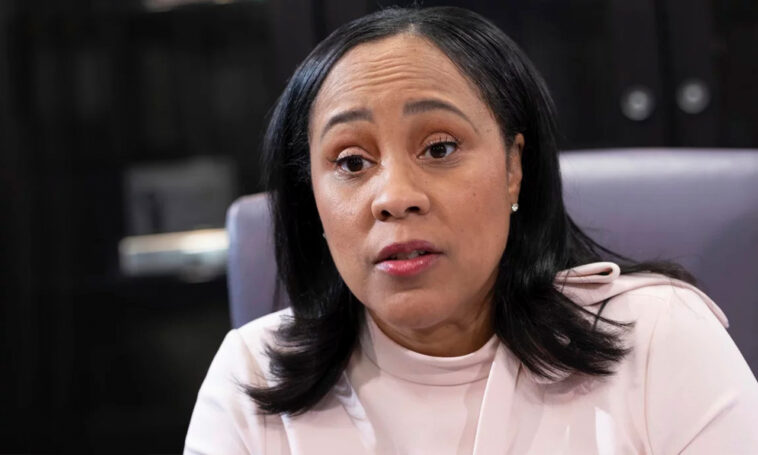A Georgia judge has ruled that Fulton County District Attorney Fani Willis must turn over communications she may have had with special counsel Jack Smith and the now-disbanded House Jan. 6 committee. This ruling comes after a lawsuit was filed by the conservative watchdog group Judicial Watch, seeking records of any coordination between Willis and Smith regarding the prosecution of former President Donald Trump. The case has brought increased attention to the investigation into Trump’s role in the 2020 election and the events surrounding the January 6th Capitol riot.
The legal dispute began in March, when Judicial Watch filed a suit after Willis claimed that she did not have any responsive records to the group’s request. This response mirrored what she had told House Republican investigators, who had similarly asked for records related to her election interference case against Trump. Despite these claims, Judicial Watch argued that Willis’s assertions were likely false and that such communications likely existed.
“Your attempt to invoke congressional authority to intrude upon and interfere with an active criminal case in Georgia is flagrantly at odds with the Constitution,” Willis wrote last year.
On Monday, Fulton County Superior Judge Robert McBurney ruled that Willis had violated the law by failing to respond properly to the request. The judge criticized Willis for not offering a “meritorious defense” to the claims and ordered her to produce any relevant records. Additionally, the court ordered Willis to pay the attorney fees for the suit, a decision that adds another layer of financial burden to the ongoing legal challenges surrounding the case.
This lawsuit essentially follows the work done by the House Judiciary Committee, which had previously sent letters to both Fani Willis and Jack Smith demanding they provide records of any communications between their offices, particularly concerning the case against Trump. This investigation is of significant national interest, as it pertains to the broader legal efforts to hold Trump accountable for his actions before and after the 2020 presidential election.
Willis, who has been at the center of Georgia’s criminal investigation into Trump’s alleged attempts to overturn the 2020 election results, has denied any coordination with Smith or the House committee. She previously responded to accusations from House Judiciary Chair Jim Jordan (R-Ohio), who had suggested that Willis’s office was improperly coordinating with federal prosecutors. In a letter, Willis strongly rejected the claim, asserting that any attempt to invoke congressional authority to interfere with the ongoing case was “flagrantly at odds with the Constitution.”
Despite Willis’s denials, Judicial Watch’s suit questions the veracity of her claims. The group’s legal team believes that Willis’s office may indeed have communicated with federal authorities in a way that could affect the ongoing case against Trump. The judge’s ruling on Monday represents a significant victory for Judicial Watch, which is committed to ensuring transparency in government communications and holds public officials accountable for their actions.
The case is part of a larger legal and political battle over the prosecution of Trump. The former president faces several legal challenges, including charges related to his attempts to influence the outcome of the 2020 election. These include accusations of election interference, obstruction of justice, and his role in the January 6th Capitol riot. With multiple investigations and court cases underway, the controversy surrounding Trump’s legal troubles shows no signs of slowing down.
For Fani Willis, this ruling represents a setback in her efforts to control the narrative around the prosecution. The order to release communications with Jack Smith and the House Jan. 6 committee raises questions about the degree of coordination between state and federal authorities in their pursuit of criminal charges against Trump. While the judge’s decision could provide more transparency, it may also fuel further scrutiny from both Trump’s defenders and his critics.
The political fallout from the ruling is also significant. As the legal battles involving Trump continue to dominate headlines, this case adds another layer of complexity to the ongoing national debate over accountability and justice. While Willis’s office is under pressure to comply with the judge’s order, her office maintains that it has acted appropriately in pursuing the case against Trump.

The decision to order the release of these communications is a win for Judicial Watch, a group known for its aggressive legal tactics aimed at increasing government transparency. The group has long fought for accountability and has been active in challenging what it sees as improper government actions. Its focus on the communications between Willis, Smith, and the House committee reflects a broader concern about transparency in high-stakes legal cases.
As the case moves forward, the public will be watching closely to see how it unfolds. Whether or not this ruling leads to new revelations about the Trump investigation remains to be seen. However, one thing is clear: the legal battles surrounding the former president’s attempts to overturn the 2020 election will continue to be a major focus of national attention.



